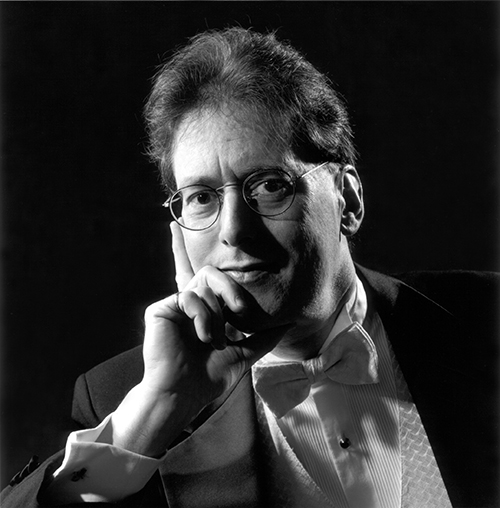Zander, Boston Philharmonic reach the summit with Bruckner

Benjamin Zander conducted the Boston Philharmonic in music of Mozart and Bruckner Friday night at Symphony Hall.
For the Classical purist, there may be no finer Mozartean than Robert Levin.
His scholarly editions and completions of Mozart’s unfinished music—notably the Requiem— are key sources for performances around the world. And as a pianist, he favors a delicate, crystalline touch and luminous tone that is well-suited to the composer’s concerti, even when played on a modern grand piano.
Levin made his long-awaited return as soloist with the Boston Philharmonic at Symphony Hall Friday night, offering a lithe and sparkling performance of Mozart’s Piano Concerto No. 25. Conductor Benjamin Zander led the way.
From the get-go, one could tell that the Boston Philharmonic, with its precision and clear direction, has a fine feel for Mozart’s music. Cast in a grand ceremonial style, the C major concert (K. 503) has been called Mozart’s “Emperor.” In the expansive and stately first movement, Zander’s buoyant tempo commanded rapt attention from the musicians. The second movement had the delicate lyricism and well-turned phrases of chamber music. And in the finale—based on a gavotte from Idomeneo—solo flute and oboe floated graceful countermelodies over Levin’s trickling solo passages.
Throughout, Levin played with tasteful ebb and flow to the phrasing while keeping excellent balance in the dialogue between his piano and the ensemble. He applied the pedal for subtle legato, but the effect never got in the way of his clear, bell-toned execution of the running melodies. Every note slotted neatly into place.
Levin brought out his most energetic playing in the cadenza. The pianist, a skilled improviser known for making up cadenzas on the spot (Mozart left no cadenzas for this concerto), supplied a characteristic and sparkling display of trills and cascading arpeggios that gathered momentum in the accelerating tempo.
After intermission, Zander led the orchestra in Bruckner’s Symphony No. 7.
For all of the attention to Mahler’s symphonies, especially in recent concerts, the Boston Philharmonic does not program the music of Anton Bruckner very often. Perhaps the best-known of the composer’s late symphonies, the Seventh brims with grand, arching melodies and luminous orchestral textures.
As the architect of this cathedral in sound, Zander paid careful attention to the details in the score, wringing fine, arching phrases from the orchestra to frame its colossal form. The surfeit countermelodies of the Seventh were given the clarity one would expect from a symphony by Mozart or Schubert. The resulting performance invited intimate listening of this imposing work.
The prayerful melody that opened the first movement, given rich-toned and sensitive treatment by the cellos, complemented the gentle rolls and impish dance rhythms of the second and third themes.
Some of the most moving moments in this symphony are found in the second movement. Bruckner composed this stirring music in anticipation of Wagner’s death. The shimmering tone of the strings didn’t quite mine the reverent, funereal depths of the main theme. Elsewhere, the brass, filled out by four Wagner tubas, supplied pillars of chords, sounding round and warm, but never heavy.
Zander pushed the tempo for the hard-driving Scherzo, and, despite a few split notes from the solo trumpet, the large orchestra sounded light on its feet. The trio, featuring glowing woodwind lines, made for a supple and savory counterweight. For the finale, Zander drew out the phrases of the opening march to good effect, and the second-theme chorale was put across with reverence.
Yet the orchestra answered with power when called upon. The Boston Phil brass stepped up to supply a sturdy wall of sound in the movement’s climax. The orchestra sounded its fullest at the end to bring this symphony to a glorious close.
Benjamin Zander will lead the Boston Philharmonic Youth Orchestra in Mozart’s Marriage of Figaro Overture; Barber’s Violin Concerto, with Max Tan as soloist; and Mahler’s Symphony No. 5 8 p.m. March 7 at Symphony Hall. bostonphil.org
Posted in Performances
